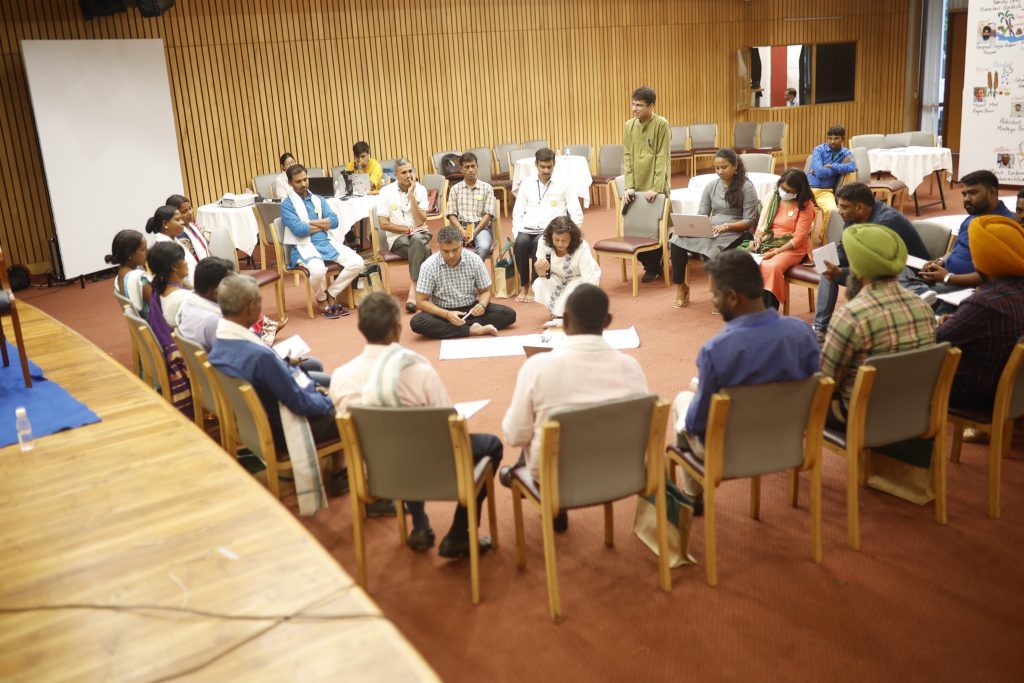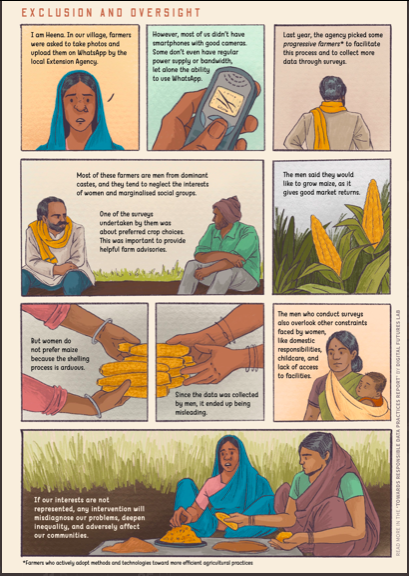برف کا تودہ
(Barf ka toda, Urdu) Glacier

Photo by Ahmed Radwan/ Unsplash
From heatwaves and shrinking rivers to parched fields and monstrous floods, the world witnessed extreme events throughout August. The flooding in Pakistan, compounded by glacial lake outbursts, is yet another reminder of how vulnerable we are in the face of the climate crisis. Everything is interconnected; the consequences of these global events, especially with respect to water and food security, will impact us all in the coming months.
At the Rainmatter Foundation, the month was chock-a-block with long conversations, deep engagements and multiple events. We met folks from the Balipara Foundation to learn about their restoration efforts and linkages of ecological outcomes with economic and social ones; this is captured in their Rural Futures Index. This resonates with our notion of Place Indicators that not only captures the holistic sense of the house for any place, but can also help make better tradeoffs. We got a preview of CEEW’s work on the Place Indicators at their new office, which is an inspiring space with 100% biodegradable flooring in the lobby and recycled flooring elsewhere, an optimal use of lights and many such examples of energy and material efficiency on display.
At the Indiaspora Event, we discussed how philanthropy has been changing in India especially in the context of Covid and the now evident climate crisis. Thanks to Anshu Gupta of Goonj, a strong consensus emerged around the need for the solutions to be community-led. We also met a few organisations working in the Himalayas to understand what a mainstream push for solutions, which would also account for the climate crisis, might need. Apart from this, we also discussed alliances for large scale restoration linked with livelihoods, a larger consensus on an India View around climate that goes beyond the temperature and carbon framing of it, and the need for scaled efforts even at the government level, with various partners and stakeholders.
People’s Archive of Rural India (PARI) became a part of the Rainmatter network. We also embarked on a partnership with P. Srinivas Vasu, better known as Soil Vasu. With him, we hope to create an army of grassroots practitioners who can help heal India’s soils. An immediate task at hand is to find farmers and practitioners passionate about soil and then gradually build their capacity. We also want to create a database of farmer-reported soil health. Do email us ([email protected]) if you can help and aid us in either of these chases.
We’ve held from the word go that organisations should chase their goals freely and be audacious given the urgency to respond to the climate problem. So our support to the partners we work with is non project specific, unfettered and flexible. Over the last year and a half, we have seen a few organisations use this flexibility really well. Farmers For Forests has iterated rapidly, learnt a variety of models both with individual farmers as well as with communities and collaborated with a variety of stakeholders. SayTrees has built capacity in the team to expand beyond Bangalore and its periphery, understand and scale agroforestry efforts and has even adopted natural regeneration in the right context.
The Center for Wildlife Studies has not only managed some regulatory landscape changes well, but also expanded focus to kick off restoration through agroforestry efforts among the communities they work with. We are working together to arrive at a broader set of goals about what conservation in the context of buffer zones implies.
Sauramandala Foundation had set their sights on expanding their fellowship model for social changemaking to more nodes while also discovering non-linear pathways for expanding this beyond their direct areas of operations. They have had some splendid success with the Government of Meghalaya to adopt the idea of changemaking through district fellowships to drive rural entrepreneurship.
Many other partners are also starting to think and push at a much bigger scale. We are amazed how partnerships across the network are starting to emerge to help with this. Just like feedback loops accelerated climate change, we believe all these actions will start to add up to something much bigger than any single effort or organisation would otherwise be able to achieve. Godspeed!
From the Community

Socratus Foundation conducted a Citizen Jury process on ‘Dignified Income for Agricultural Households‘ in mid-August. A Citizen Jury is a concept that offers regular citizens an opportunity to participate as full citizens, deliberate on themes relevant to them and contribute to the policy dialogue. This time the jury comprised 20 diverse farmers from 13 states. The jury was selected to capture the diversity in agro-climatic zones, landholding sizes, crops cultivated, gender and market experience. ‘Expert Witnesses’ and leaders from bureaucracy, civil society and academia, who are deeply involved in the lives of farmers and farming systems, presented their policies, entitlement provisions and perspectives to the jury.
The jury deliberated on the presentations and directly cross-examined the presentations. The themes include the Future of farming (new technology and practices), Prices (MSP, NTFP, market/mandi, inflation, global trade), and Expenditure (seeds, fertiliser, labour, health, nutrition and education). After a few rounds of deliberations, the jury announced a set of recommendations on what they felt were important for farmers’ dignified income. The recommendations covered the following points:
- Legal guarantee of MSP linked to district-wise area production plan which considers the district’s PDS needs and local ecology.
- Expanded insurance coverage in order to deal with the increasing impact of climate change.
- Horticulture and forest produce should be encouraged. Local vegetables and fruits should be given in anganwadis and mid-day meals to improve nutrition and farmer incomes.
- Farmers and governments need to innovate to adapt to climate change. Farmers should be given carbon credits for agroforestry and other carbon-friendly farming practices.
- The government needs to increase training, research and infrastructure for technology and marketing. Farmers need subsidies on machines, and the subsidy process needs to be simplified and improved.
Reap Benefit partnered with Delhi’s Ministry of Environment to launch Paryavaran Mitra, an initiative to engage citizens in environmental and civic problem-solving. Within two weeks of the launch, more than 3,000 Paryavaran Mitras took 1,123 actions on waste management, pollution control and improving green cover in their communities. If you are in Delhi, you can simply give a missed call to 8448441758 and start getting nudges, knowledge, and toolkits to take action.
The Reap Benefit team also partnered with the Hume Centre for Ecology and Wildlife Biology to build a dashboard for rainfall data for Wayanad district. The data is crowd-sourced via Hume’s citizen science initiative.
The Ecological Restoration Alliance India is off-the-ground. The alliance comprises restoration practitioners and ecologists, who have come together to foster collective efforts to support and sustain ecological restoration in India. It seeks to identify geographical areas and threatened sites that urgently need active ecological restoration as well as enable individuals and groups to plan and responsibly execute ecological restoration. Check out their projects, resources and species from different ecoregions here.

Waste Warriors’ Vishal Kumar wrote about why the Himalayas are drowning in waste for IDR. The WW team also conducted a menstrual waste management workshop with the women from Bir panchayat; the discussion included sustainable alternatives to single-use pads and the team demonstrated how women can stitch their own cloth pads. More updates here.
Noticeboard
- Want to double your #ClimateKarma points? Donate books or contribute to Bangalore’s first climate library, a collaborative effort by the folks at Bangalore Creative Circus and Iku Earth.
- Here’s a handy list of political ecology films via Anna of Uneven Earth. Thanks Anna!
- Watch this mesmerising video of one wing flap from 15 moth species.
- Ants for kids: The Myrmecological News Blog demystifies ants for kids with helpful illustrations and guides to what is and is not an ant, the anatomy of an ant as well as an ant crossword!
- Download Current Conservation’s latest edition for a deep dive into the ecology of killer whales and the need to protect swimways, the history of ambergris (whale vomit) and a tour of a marine research vessel that uses bioacoustics to track false killer whales.
- Here’s a chance to nominate someone for their sustained effort to protect and conserve rivers. Bhagirath Prayaas Samman (BPS) wants to recognise unsung heroes who have been instrumental in protecting rivers. If you know someone who fits the description, let them know by 30th September.
- Bangalore Sustainability Forum is inviting applications for its Small Grants Programme. Proposals should pertain to urban climate change and must be collaborative in nature with at least two individuals, organisations or institutions driving it. Apply before 18th September. Details here.
- Also tune into OORU, BSF’s podcast about Bengaluru’s move towards a more sustainable future.
- Jobs: Waste Warriors needs people for multiple positions. Reap Benefit is looking for a part-time grant writer.
- What if we designed homes to stay cool, wonders Nithya Subramanian in Mongabay India.
- Download the Handbook for Nature Guides by naturalists Payal Mehta and Harsha Jayaramaiah, and illustrated by Manasa Murari. It encapsulates material and learnings from NCF’s Nature Guide Training Course, including guiding techniques and ethics in tourism that are essential for all responsible nature guides.
- The National Portal for Rooftop Solar allows residents willing to install rooftop solar to apply for it online. The resident/consumer will have the option to select the vendor, solar panels, invertors, quality and efficiency as per his choice.

- Digital Futures Lab’s report Towards Responsible Data Practices for Machine Learning in India: Health & Agriculture’ by Harsh Bajpai and Angelina Chamauh features a graphic short by Kshiraja Krishnan; the agriculture section focuses on farmers who are sidelined in private sector tech solutions that strive to solve their own problems, women and lower caste farmers whose specific contexts are often dismissed and policy researchers attempting to ask important questions about public-private partnerships in the space. Read the report and the graphic short here.
Parting shot
Ditching the car is one of the most helpful things we can do personally to reduce emissions!
Until next time, may your roads be auspicious, śubhāste panthānaḥ santu
-Team Rainmatter Foundation
